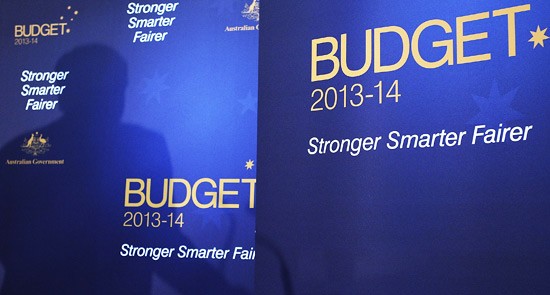
One of the recurring features of covering the budget from within the lock-up — and Crikey has only been doing it for six years, so we’re still n00bs — is a tendency to come down hard on it while you’re in the lock-up and then, in the cold light of day, soften somewhat.
I’ve realised that’s because in the hours after the budget is released, a very long succession of lobbyists, rent-seekers, NGOs and concerned community groups line up (literally, in the hours after the budget is released, up in Parliament’s press gallery) to criticise it or complain that they failed to get something from the budget. Eventually, the criticism becomes so wearing one starts to think the government must have done something right to annoy so many people.
This year, I’m not yet inclined to revise my initial view that it’s not a bad budget at all, albeit with too few spending cuts compared to tax rises, but its political message is awry, just like the government’s broader economic message has been confused over recent months.
Putting aside my now-traditional “tax rises are not savings” complaint, what yesterday’s budget does get right is the gap between its new spending and its savings — over $40 billion of the latter (and more in the years beyond) versus around $12 billion of the former. In no previous Labor budget has that gap been anywhere near as great. Usually, Labor has been content to spend most of its savings.
A couple more of those sort of gaps over the last six years would have made life far easier for Wayne Swan and Julia Gillard heading into an election, as would realising the benefits of staggering savings so that they pile up at the end of forward estimates and beyond, rather than hitting immediately — not since 2010 when the Rudd government predicted big revenue from its original mining tax (the RSPT) has the gradient of “savings” been so steep across the forward estimates.
“It is, however, frustrating that Swan continues to lament that the current tax to GDP ratio is so low compared to the Howard years.”
It is, however, frustrating that Swan continues to lament that the current tax to GDP ratio is so low compared to the Howard years. This is not some economic accident; there’s been no fickle fiscal finger of fate that has pointed at Swan and condemned him to the Sisyphean task of permanently pushing a deficit uphill. It was Swan who handed out personal income tax cuts in 2008; it was Swan who agreed to wind back the mining tax. The current structural problems of the budget may mostly reflect the Howard government’s decision to use the mining boom to fund permanent tax cuts, but this government has played its part too.
Nonetheless, if this indeed turns out to be Swan’s last budget, he’ll leave an outstanding economic legacy — managing to avoid recession from the GFC, managing to avoid inflation from the mining boom, securing the strongest possible credit rating, making space for a national disability insurance scheme and overseeing historically low interest rates despite employment growth.
His fiscal record is less impressive: the government has made a start on curbing spending in areas like middle-class welfare and tax concessions, and incurred political pain in doing so, but never really wielded the axe outside areas where it has been politically safe to do so, like the public service. He’s definitely been superior to Peter Costello in the last years of the Howard government, but that’s not saying much at all. Even so, Swan maintained his fiscal discipline to the end, in effect dying on his feet rather than, like his predecessor, going out on his knees hurling money at voters in a desperate bid for electoral mercy.
The voters won’t be give him any credit, but he’s been a far better Treasurer than virtually any of us expected when Kevin Rudd confirmed his position in the lead-up to the 2007 election.








I was so glad to see the flying fiscal finger of fate meet Sisyphus in the same sentence…quite unexpected.
Also, it was good to see Mr Keane being fairer and kinder than the mob of hacks running their partisan talking points.
Crikey, you really can be a big cut above the crowd.
“Moderation” really?
FFS
“It is, however, frustrating that Swan continues to lament that the current tax to GDP ratio is so low compared to the Howard years.” It’s not my impression that Swan has been ‘lamenting’ this ratio; rather he has been proud that it shows Labor government taxation as relatively low. He’s now doing something to increase the ratio but Bernard sees this as worse than cutting spending. It’s not a crime to increase taxes and an increase in the GST rate may have been a better solution to the problem of funding big initiatives like NDIS, Gonski and infrastructure. Our tax:GDP ratio is one of the lowest in the developed world.
I dont think Swan, and Labor’s, position would be any different. It has mainly brought about by the propaganda of the MSM. When MSM is talking about how bad things are and talking down the economy and Australia’s position in relation to other developed countries what chance does the average punter in the street have of making a truly informed opinion?
When comments like Abbotts comparison between what Cyprus did to people’s bank accounts with what the Govt did in introducing the 15% tax on superannuation earnings gets more airing in the media than the facts, it’s clearly propaganda generated by the MSM.
who can remember a Lying Rodent?